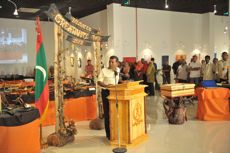Inmates at Maafushi Island Prison are to be categorised into four groups according to security risk, with the least dangerous criminals to be tagged and released on work and study programmes.
“This is a huge change to the prison system,” Naseer told Haveeru adding that the reforms will reduce state expenditure on the rehabilitation system.
Older inmates or inmates nearing the end of the sentence will be housed in an open jail on a separate island, Home Minister Umar Naseer told local news agency Haveeru today.
Inmates in category two will be allowed to work on the industrial Thilafushi Island, and the most dangerous criminals or category one criminals will continue to serve their sentences behind bars in Maafushi prison.
“This will be advantageous to the state budget. Secondly, it will allow criminals to undergo rehabilitation and integrate back into society. With this, when inmates are released from jail, they will have undergone one of the programs,” the Home Minister told Haveeru.
The inmates who are to be released on the work and study programme will have an electronic tag fixed to their legs. In addition to undergoing a security screening, they will also have to be nearing the end of their sentence.
“They will have to do one or the other [work or study]. If they are working, we have to know where they are going. We also have to know the exact route they are taking. Through the tag, we can track which streets they are walking on,” he said.
The home minister said the tags have been tested during his trip to Singapore earlier this week. An expert team is to visit the Maldives to demonstrate how the tags work to government offices, he said.
The open jail is to be established on an uninhabited island. The government will provide modest shelter, run a mosque, and establish an administrative office and a security post. The inmates will cook for themselves and be self- sufficient, but will not be allowed to leave the island, Naseer said.
“These are people who pose no harm to society. And elderly inmates who are weak,” he said.
Plans are underway to designate an island for the open jail. The Home Ministry is currently working on a policy paper on the matter to be submitted to the social council at the President’s Office.
Category two criminals will be provided employment with the Road Development Corporation and will be put to work and housed on Thilafushi.
The Maldives Correctional Services (MCS) and the corporation have already signed an agreement to transfer jobs from expatriate workers to inmates.
“The Road Development Corporation’s labour quarters will be changed into prison labour quarters. That means there will be a fence around the quarters,” he said.
Inmates will be released during the day for work and brought back to the labor quarters at night. The renovation is expected to cost MVR6 million (US$ 389,105) and will be funded through the state budget.
Approximately 50 inmates are already employed on Thilafushi, he said.
The reforms will reduce the prison population from 1000 inmates to 300 or 400 inmates, the home minister said.
Naseer has overseen a series of radical changes including a decision to implement the death penalty.
New regulations formulated in April have ended a sixty-year moratorium on the practice. The Maldives Correctional Services is now preparing facilities to implement the death sentence through legal injection.
